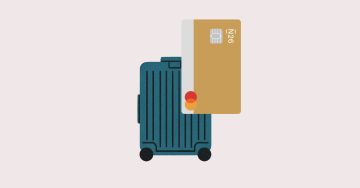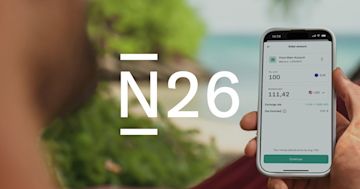Using your card in Brazil: The complete guide
If you're planning to travel to Brazil, you might wonder if you have to carry Brazilian reais (BRL), or if you can use your debit card while sightseeing and shopping abroad. Holidays should be relaxing, not stressful — and preparing in advance will help you avoid any unpleasant surprises in Brazil.Read on to find out if you can use your debit card while in Brazil, which ATMs are available to tourists, if you risk being charged extra fees, and much more.
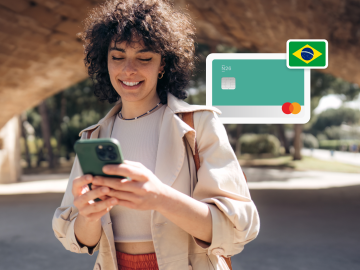
Can I use my debit card in Brazil?
Whether you’re traveling for business or pleasure, using a debit card in foreign countries like Brazil can come in handy — not only for convenience but also as an extra measure in case you run out of Brazilian reais. Generally speaking, many establishments in Brazil accept debit cards, especially cards affiliated with major international payment networks like Visa or Mastercard.
Are debit cards widely accepted in Brazil?
Debit cards have become increasingly popular and widely accepted in Brazil, especially in urban areas and tourist destinations. Many establishments, including restaurants, hotels, and retail stores, have card payment terminals that accept debit cards from major international networks like Visa and Mastercard.While major cities and tourist areas in Brazil typically accept debit cards, some smaller shops, local vendors, or remote locations may only accept cash. Carrying some Brazilian reais for these situations is always a good idea. Pix, an instant payment method developed by the Central Bank of Brazil, is increasingly popular too—but only available between Brazilian accounts.
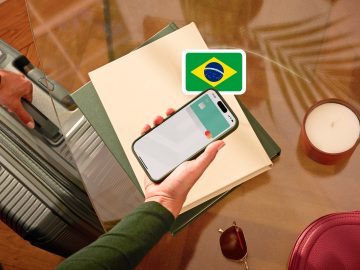
Tips for using your debit card in Brazil
Follow our tips for a smooth and secure experience when using your debit card in Brazil:
- Before traveling to Brazil, notify your bank about your travel plans. This prevents your card from being flagged for suspicious activity, and you can access your funds without any fuss.
- Always carry some Brazilian reais for small purchases, street vendors, or establishments that only accept cash.
- When using your debit card or ATMs in Brazil, always opt to be charged in Brazilian reais to avoid higher exchange fees. The exchange rate offered by your bank will usually be a better deal than the rate at the ATM or card terminal, so it’s smart to pay in local currency.
- Keep your debit card secure, and always cover the keypad when entering your PIN.
- Use ATMs in well-lit and secure areas, such as banks or shopping malls. Withdraw larger amounts less frequently, and try to choose ATMs with lower withdrawal fees.
- Always check your transaction receipts and monitor your account activity regularly. Report any unauthorized transactions to your bank immediately.
Using ATMs in Brazil
Most ATMs in Brazil are equipped to accept international debit cards. These ATMs typically display logos of international card networks like Visa and Mastercard. When inserting your card, the ATM usually prompts you to choose your preferred language and transaction type. The withdrawal limits at Brazilian ATMs vary between R$800 or R$1,000 Brazilian reais per day.Several banks in Brazil are known for being more accommodating to international cardholders, including Santander, Bradesco, Banco do Brasil, and Banco 24 Horas — but note that Brazilian ATMs only work with PIN-based debit cards. Also, because of card cloning and other scams, you're safer using ATMs within bank branches or lobbies, or in shopping malls.
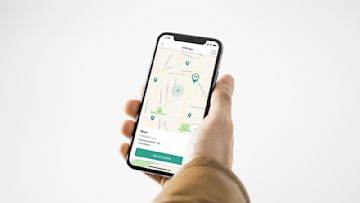
Say goodbye to exchange rate markups
N26 never marks up foreign exchange rates. This means we pass along the real exchange rates provided by Mastercard to you—no hidden fees or confusing small print to ruin your holiday.
Foreign transaction fees to look out
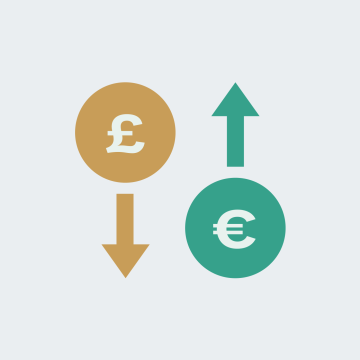

Paying with your N26 card when traveling
N26 doesn’t hide fees or add a foreign exchange rate. We also don’t tack on extra charges for rare currencies or for paying on the weekend. Spend abroad and benefit from Mastercard's real exchange rate.

Withdrawing money abroad is free with N26 Go. Anywhere.
N26 Go gives you free withdrawals in currencies around the globe, saving you up to 7% on fees. That means N26 Go pays for itself in just a few trips.
FAQs
Visa and Mastercard are definitely the most widely accepted debit card networks in Brazil, as well as Maestro. Travelers with these cards benefit from accessible and convenient payments and cash withdrawals.
Before traveling to Brazil, check if your debit card is affiliated with one of these major networks.
Although using your debit card in Brazil is usually safe, being aware of potential risks can help you and your funds stay secure.
Using trusted ATMs and practicing good card and password handling habits can improve your financial safety while you’re exploring Brazil.
You can use your debit card to withdraw cash in Brazil from several different banks, such as Santander, Bradesco, Banco do Brasil, and Banco 24 Horas. Because of card cloning and other scams, you're safer using ATMs within bank branches or lobbies, or in shopping malls.
But be mindful of your daily withdrawal limits! To withdraw large amounts of Brazilian reais, you may need to make multiple transactions over a few days or temporarily increase your withdrawal limit through your bank or banking app.
While most ATMs in Brazil don't charge withdrawal fees, Banco 24 Horas charges R$20 per transaction. At N26, all our accounts come with free card payments worldwide — as often as you like and with no foreign transaction fees.
And remember: When in doubt, always choose to be charged in Brazil’s local currency, the Brazilian real (BRL).
Using ATMs in Brazil is generally safe. However, that doesn’t mean you should throw your good security habits out the window! Boost your financial safety by choosing secure locations, inspecting ATMs for signs of tampering, shielding your PIN, and monitoring your account activity closely.
Losing your debit card or having it stolen in Brazil can be challenging, but it's not the end of your travels.
Once you realize your debit card is missing, contact your bank's customer service or international helpline to report the loss or theft. Provide details such as your account number, card number (if you know it), and the date and location where you last used the card.
With N26, you can easily lock your card or turn off international payments, right in your N26 app. Here's what else to do if you suspect a fraud.
Read more
When’s the best time to book flights? Securing the lowest faresSave big on flights to your next vacation with these helpful tips.
Understanding duty free shopping and its benefits while travelingNot all duty-free goods were created equal! Here’s what to buy and what to avoid to save some cash the next time you’re in the airport.
Trip cancellation insurance—why you might need itTrip cancellation insurance—the ‘just-in-case’ coverage for extra financial protection
More about International Money Transfers
Save money using your debit card abroad with N26N26 gives you the real exchange rate and won’t charge currency exchange rates when paying abroad. Sign up to save on your next trip.
How Does Foreign Currency Exchange Work? – N26Foreign currency exchange is how you measure the value between two different currencies. Read our guide to learn more.
Foreign transaction fees—what are they and how do they work?Need to make a payment overseas? Check out our guide to foreign transactions and the fees that may come with them.



